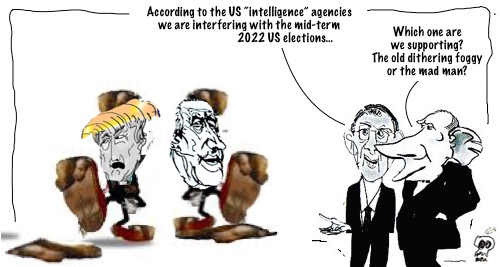Search
Democracy Links
Member's Off-site Blogs
automated voting fraud...
 fraud
fraud
In 2017, Professor J. Alex Halderman demonstrated to the Senate Intelligence Committee that it was very easy to rig Dominion voting machines. The corporation had then overhauled its machines in order to guarantee the integrity of the ballots.
During the 2020 US presidential election, Georgia Secretary of State Brad Raffensperger (Republican) encouraged residents of his state to vote by mail and provided Dominion machines for those who were determined to vote in person.
President Donald Trump had contacted Secretary Brad Raffensperger by phone. Their conversation was recorded and cherry-picked excerpts were used against him; Mr. Raffensperger insisted that President Trump had pressured him to modify the Georgia results.
This gave rise to considerable controversy over the transparency of the election results in that state.
In-mail votes are counted by Georgia government employees, often without public oversight. Machine votes are tabulated by the machines themselves.
The Cybersecurity and Infrastructure Security Agency (CISA) had assured that the Dominion machines were absolutely reliable and that the result of their count brought victory for candidate Joe Biden.
In view of the controversy, the State of Georgia then commissioned Professor J. Alex Halderman to draft a report. However, CISA filed a lawsuit against Georgia to prevent the declassification of the report, on the pretext that it would allow ill-intentioned people to hack into these voting machines.
For his part, Secretary Raffensperger has joined many voters in calling for the declassification. Now it is likely that the declassification will finally be authorized by a judge ... but only after the "sensitive" parts of the document have been redacted.
CISA has not responded to questions about its change in attitude in relation to the position it held in 2020.
It is worth remembering that in democratic countries the counting of votes cast during an election is a public act.
Read more:
https://www.voltairenet.org/article215671.html
THE CASE CONCLUSION:
…
CISA is particularly concerned about dissemination of potential vulnerabilities—even in redacted form—before CISA and the vendor have been able to address them through appropriate mitigation action. Such premature disclosure increases the risk that malicious actors may be able to exploit any vulnerabilities and threaten election security. CISA respectfully submits that, in order to best promote the security of the nation’s critical infrastructure, any vulnerabilities should be disclosed—with the maximum appropriate transparency—in accordance with the CVD process. CISA’s goal is to disclose any confirmed vulnerabilities and associated mitigations to the public in a coordinated way, so the entire cyber ecosystem can benefit while minimizing the risk of harm to election security.For these reasons, CISA respectfully submits that public disclosure, even in redacted form, should await completion of the normal CVD process. CISA is committed to prioritizing this work and ensuring it is given the attention it deserves. CISA proposes that it notify the Court within 30 days of any status updates regarding the process or the anticipated timeline for completion, as well as any updates regarding CISA’s views as to scope and information to be included in a future public disclosure.
Respectfully submitted,
BRIAN M. BOYNTON
Acting Assistant Attorney General
BRIGHAM J. BOWEN
Assistant Branch Director
/s/ Kate Talmor
KATE TALMOR
Trial Attorney
Civil Division
Federal Programs Branch
US Department of Justice
1100 L St., NW
Washington, DC 2005
202-305-5267
kate.talmor@usdoj.gov ----------------- FREE JULIAN ASSANGE NOW !!!!!!!!!!!!!!!!
- By Gus Leonisky at 16 Feb 2022 - 6:02am
- Gus Leonisky's blog
- Login or register to post comments
Recent comments
1 hour 9 min ago
1 hour 17 min ago
1 hour 29 min ago
7 hours 22 min ago
7 hours 59 min ago
10 hours 32 min ago
11 hours 28 min ago
14 hours 34 min ago
1 day 2 hours ago
1 day 6 hours ago